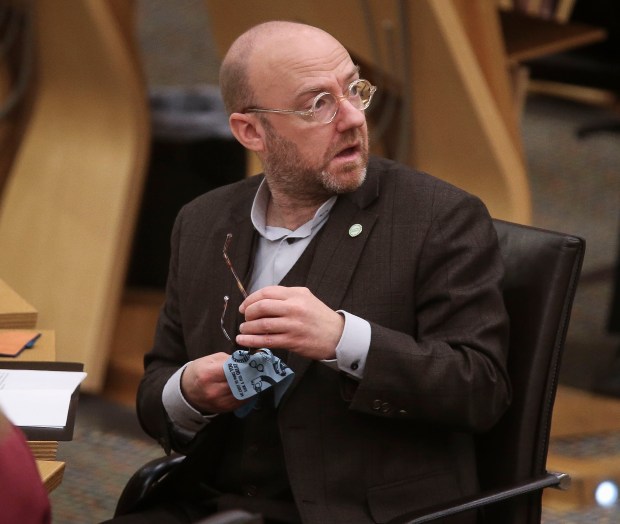Like all good fables, Douglas Ross’s speech at Tory conference had a beginning, middle and end. Act One detailed the many iniquities of the SNP, from their dysfunctional vaccine passport scheme to their Hate Crime Act, and most of all their agitation for Scotland to break away from the UK. Act Two took the sword to Labour, bemoaned its abandonment of working-class voters and its internal divisions over the constitution. Theirs was not the party to take on the SNP. Only one party was and it was the subject of Act Three, in which Ross deepened a theme begun under Ruth Davidson’s leadership: the Scottish Conservatives as the party of the Scottish working-class.
He hit all the familiar notes about the SNP’s failings in government, the ones that never seem to stick longer than two or three news cycles and are invariably forgotten about by the next election. He also hinted at an interesting theme that, if teased out carefully, could come into greater play. It is the perception, no longer wholly limited to unionists, that Nicola Sturgeon is a bit… off. Out of touch. Superior. Maybe even a bit of a snob. As Ross put it:
Nicola Sturgeon has become detached from working-class communities scarred by drug deaths and marred by all the other failings that her government is too distracted to tackle. She has become out of touch, talking down to everyone who doesn’t speak at her apparent ‘higher level of intelligence’.
That last part is a reference to a testy exchange with journalists in July when Sturgeon insisted she hadn’t missed a key vaccination target — her opponents and the media had simply misunderstood her. ‘I kind of communicate at a level where I assume a certain level of intelligence on the part of people listening to me,’ she told them.
The SNP’s natural rival in Scotland used to be Labour but the party fell into third place at Holyrood two elections ago and shows no signs of recovering, despite the arrival of a young, media-savvy leader in Anas Sarwar. Ross talked up Tory gains in May’s devolved election, which saw the party defy polls and pundits to turn in its best performance yet in 22 years at Holyrood. Pointing to an offer from Sarwar to work with Sturgeon’s government after the election, Ross contended: ‘Labour would rather work with the SNP than stand up to them. Is it any wonder that pro-UK voters have deserted them?’ The red wall had collapsed in Scotland just as much as it had in the north of England. ‘The working class of Scotland didn’t leave Labour, Labour left them and now they look to us to represent them,’ he said.
This brought Ross to the most audacious section of his speech, in which he pitched the Tories as the workers’ party in a struggle against a ruling SNP that didn’t understand or care about them. The new target for demolition was ‘the yellow wall’. The Scottish Tory leader asserted: ’We are the party of working-class unionists in Scotland now because we represent their values.’ There was a time when the phrase ‘working-class unionists’ meant something very different in Scotland — something scored by a flute solo — and it is a testament to how much the 2014 referendum upended decades of political convention that no one will (credibly) try to argue that Ross was pitching for the Orange vote.
A combination of the constitution and a perception that Nicola Sturgeon is the wokest white woman you know has conspired to convince some of what Ross calls ‘working Scotland’ to give the Tories a second look. It is no coincidence that when he came to speak about Holyrood, a parliament whose members are very exercised about every measure of diversity imaginable, he highlighted the largely overlooked ‘working-class representation gap’.
For those more assertive unionists, the ones who loathe Sturgeon in the way Labour voters once did Margaret Thatcher, and those who miss Ruth Davidson’s more abrasive style, Ross had some meaty rhetoric. ‘We are not here to play by their rules,’ he said. ‘We are here to build Scotland’s real alternative.’ It was ‘not good enough to stop an SNP majority’ in future; ‘we have to stop nationalism for good’. Not just stop them, but ‘remove them’. It’s a style of language more in line with his bolshier performances at First Minister’s Questions lately.
It was not a landmark speech — the writing was workmanlike and the delivery okay — but it didn’t have to be this far out from another Holyrood election. It did give more insight into where Ross believes the Scottish party needs to be. Unsurprisingly, it doesn’t sound all that far from where the party is in England, with a focus on blue-collar voters, crime, and free speech — but there is an added dimension of urgency. The Scottish Conservatives don’t have the luxury of their main rival party of being astonishingly incompetent, riven by division, politically listless and unpopular with the voters. The SNP is not unpopular with the voters.
Of course, all the talk of ‘removing’ the nationalists prompts the question: replace them with what? A minority Tory government? (Pretty unlikely at this point.) A pro-Union coalition? (Unlikelier still.) A much-weaker SNP administration hemmed in by a majority pro-UK parliament? (Sounds more plausible, as things stand.) Douglas Ross is sounding more and more like a leader of the opposition. The question is whether he can ever capture the tenor and tone of anything more than that.
Got something to add? Join the discussion and comment below.
Get 10 issues for just $10
Subscribe to The Spectator Australia today for the next 10 magazine issues, plus full online access, for just $10.




















Comments
Don't miss out
Join the conversation with other Spectator Australia readers. Subscribe to leave a comment.
SUBSCRIBEAlready a subscriber? Log in